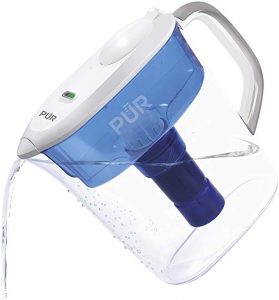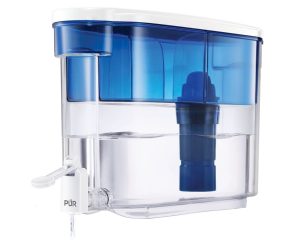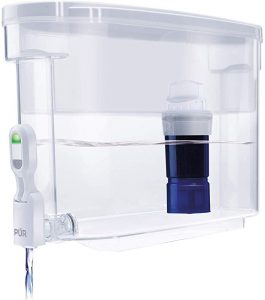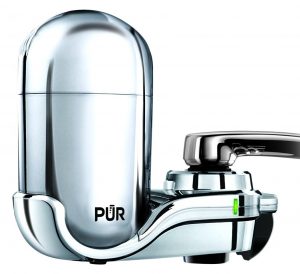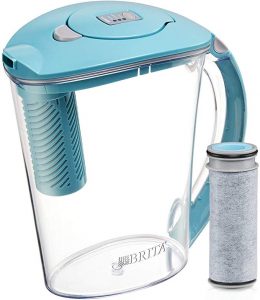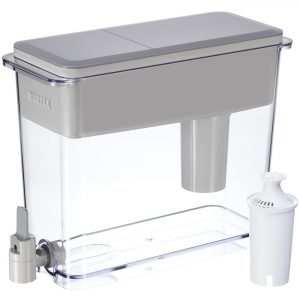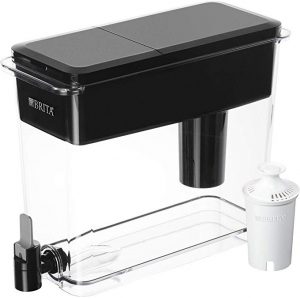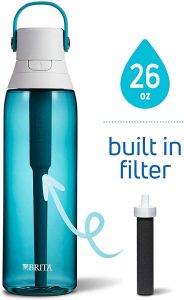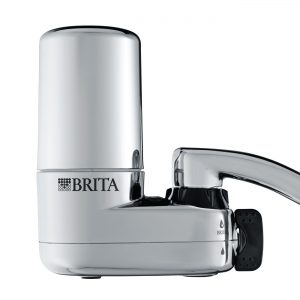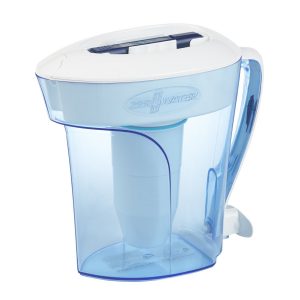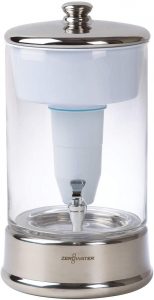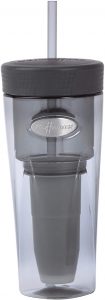Everyone deserves drinkable tap water. It’s affordable, efficient, and ensures you can wet your whistle whenever your mouth feels dry. However, while those in developed nations have easy access to potable water, there’s a big difference between potable and delicious. Just take one sip of filtered water and you’ll immediately taste the difference.
Water filters exist to clean your water more thoroughly and to provide the cleanest, tastiest water possible. Various companies exist and each has their own filtration methods. Many people recognize Brita since it was one of the first to hit the market, PUR and Zero Water compete on an equal footing with their own premium products.
Whether you want more palatable water or the thought of lead and dissolved solids in your water sickens you, these filters provide a fantastic solution to obtaining clean water. It’s more affordable and eco-friendly than using water bottles. Let’s take a look at the three major brands and help you decide which is best for your needs.
1. Pur
Pros:
Pur has marked itself as one of the top brands in the water filter market. Aside from their units being very compact and easy to fit on a kitchen counter, they also use an LED indicator on their filters and are known for drastically reducing particles from 16 different contaminants. For example, this will remove 97% of chlorine, 96% of mercury, 87% of zinc and many more. You can count on Pur to make your water a little purer.
Another bonus is that the pitcher is BPA free, further shielding you from contaminants. The filter uses the Maxion process. Both coconut shells and activated charcoal are used together to filter out unwanted and harmful particles, trapping them deep in the filter. These filters last around two months or up to 40 gallons, which should be plenty for most homes. Most filters have an easy to open lid that you can lift with only your thumb.
Cons:
When it comes to drawbacks, there are only a few as they aren’t bad at all. The Maxion process is great at removing contaminants, but it’s very slow. It will take longer than usual for water to feed through the filter and be completely clean.
If you’re on the move and don’t have time to sit around and wait for the water to filter, then this might be a problem. However, if you’re just going to fill the pitcher and let it sit until you’re thirsty, then this should be just fine.
Another drawback is that even though the filter can remove many harmful contaminants, it doesn’t remove fluorides. This is a common inclusion in water, but if you are sensitive to it this may be a problem.
Recommended Products:
PUR 11 Cup Pitcher: Pur’s most popular product, this pitcher is great for families or offices. With a capacity of 11 cups and Pur’s great filtration system that can remove 95% of most pollutants, you can get gallons of pure water at a much cheaper price than bottled water. Filters last about two months.
PUR 11 Cup Ultimate Pitcher: PUR’s Ultimate line takes everything about the Classic products and makes them better. This water filter is certified to remove 99% of lead and 22 other contaminants to give you cleaner water. Each filter cleans 40 gallons of water and the CleanSensor Monitor shows you the filter’s status. This is the perfect water filter for those seeking the cleanest, tastiest drinking water.
PUR 18 Cup Dispenser: This has all the great features of the Classic 11-cup pitcher. From the high filtration rate to the filter lasting a great 40 gallons or two months, the only difference is that the pitcher holds up to 18 cups of water. Perfect if you have a few more thirsty mouths looking for clean, delicious water.
PUR Ultimate Dispenser: The PUR Ultimate Dispenser holds about a gallon of water and filters out 99% of lead and 22 other contaminants. Tap water might look clean, but you’ll definitely taste a difference after running it through the Ultimate filter. This dispenser provides about 40 gallons of water before needing a filter change. The CleanSensor Monitor will tell you exactly when a filter change is needed.
PUR Advanced Faucet Water Filter: The replaces your faucet with a Pur filter, ensuring you get great water right from the tap. You can easily snap the filter on and off as needed, and it filters 100 gallons for three months. A colored indicator on the side tells you when it’s time to replace the filter. Compatible with standard faucets only.
2. Brita
Pros:
As one of the first and most popular brands of home water filters, you’ll find that Brita products function to a high standard. The entire pitcher is BPA free, and you’ll love how the filter blocks both smells and tastes from contaminants. Most of the bad taste comes from chlorine, and Brita does a wonderful job of removing this from drinking water.
The filter contains both activated charcoal and ion-exchange resins. The charcoal is made from broken down coconut shells. The charcoal is there to block the common mineral and organic contaminants, while the resins have a larger surface area and block big contaminants like heavy metals.
Another benefit is that the filtration job isn’t just thorough, it’s also very quick. You can expect a whole pitcher to be filtered and ready in less than a minute. Getting the filter started is easy. Just open the top, fill it with water and wait for it to flow through the filter.
Cons:
Just like Pur, most filters last around two months or 40 gallons, but the filter indicators aren’t quite as good. Some units don’t even have filter indicators, while others have a sticker indicator that isn’t as accurate as an LED one. Regardless, it should be fairly easy to keep track of when to change the filter if you pay attention or write down the date you last changed the filter.
A small drawback is that water is more likely to spill in these pitchers than others, but you should be fine if you’re careful.
Recommended Products:
Brita Large 10 Cup Pitcher: Brita’s flagship product, this 10-cup pitcher can filter up to 40 gallons of water for two months. Coming with a sticker indicator to help you properly change the filter, there’s also an easy-pour spout to fill cups and water bottles.
Brita Stream 10 Cup Water Pitcher: The Brita Stream is a large 10-cup pitcher with impressive filtering speed. Unlike many other filters here where you have to wait for the water to be filtered, it’s cleaned as you pour. This makes the Stream the fastest pitcher here. It’s small enough to fit in the fridge without getting in the way, but large enough to ensure that everyone gets a tasty gulp of water.
Brita Large 18 Cup Dispenser: Holding a massive 18 cups, which is slightly over a gallon, you can easily keep a whole office or family hydrated with this dispenser. A spigot at the end makes filling cups a breeze. This comes with a sticker indicator to keep track of changing filters. The filter is good for 40 gallons.
Brita 18 Cup UltraMax Dispenser: The UltraMax is designed to provide the cleanest water possible. Enjoy your water without the taste and smell of chlorine, copper, cadmium, and mercury. The filter lasts for 40 gallons, or the equivalent of 300 standard water bottles. A front spigot makes pouring and drinking easy for everyone. Whether you love water or want to drink more daily, this is the ideal filter.
Brita Premium Water Bottle Filter: Imagine the tasty water you get from a Brita filter but packed into a compact, 26oz design. Unlike other water filters that sit in the fridge or counter, the Brita Premium Water Bottle Filter is scaled down for convenience. You still get a full 40 gallons of clean water before having to change the filter, the only difference is you can go to work, the gym, or any event and have the filter right there with you. The BPA-free bottle is dishwasher safe and comes in 13 colors.
Brita On Tap Water Faucet: This unit fits over standard sinks and lets you get purified water from your sink. Can accommodate up to 100 gallons, and there’s a lighted indicator to tell you when to change the filter. To change, just pull off the top filter and then put the new one in.
3. Zero Water
Pros:
Zero Water has a lot going for it. With a laundry list of features and certifications that the other brands simply don’t have, you’ll find that this is both a premium and affordable brand of water filters. Zero Water claims that their filter removes 99.6% of all dissolved solids. Seems a little farfetched, but they have a tool that proves their claim.
Every Zero Water filter comes with a TDS (Total Dissolved Solids) meter that measures particles in PPM (parts per million). The filter works so well that the reading will often be 0, meaning that little or no particles are floating around in your water.
Along with this, they have an NSF certification, showing just how dedicated they are to cleaning up your drinking water. Both Pur and Brita cannot claim this certification. This is done through a patented 5-stage filtration process that uses ion exchange to completely remove contaminants.
Cons:
This is not a good filter for those with little time to wait. Since this filter is made to remove just about everything except the water itself, it takes a very long time. This is only good if you want something that you can set and drink at your leisure.
Another problem is that there isn’t an indicator of when to change the filter. In general, Zero Water tells customers to change the filter once the TDS starts reporting around 10 PPM. While you should get a good amount of time from your filter, it all depends on the type of water you use. Dirtier water will obviously tax the filter more than clean water.
Recommended Products:
ZeroWater 10 Cup Pitcher: A great sized pitcher for small families and offices, this can hold up to 10 cups of water and will last for several months. Be sure to check the TDS meter to see when to change the filter. Features a contoured handle to make the pitcher easier to hold.

ZeroWater 23 Cup Dispenser: Using ZeroWater’s patented filtration system, this can remove 99.6% of all solids from your water. Storing up to 23 cups of water and with a helpful spigot at the end, it’s a breeze to fill cups and other containers.
Zero Water 40 Cup Glass Dispenser: Tired of plastic? The elegant glass body holds 40 cups of clean, filtered water. The five-stage filter removes 99.6% of dissolved solids like lead and chromium. A no-drip spigot ensures easy pouring and this filter is sophisticated enough for the office, gatherings, or a centerpiece at home. It’s an efficient filter with a refined design.
Zero Water On-the-Go 26oz Water Bottle: Imagine taking the power of the Zero Water filter anywhere you go. The On-the-Go water bottle allows you to travel anywhere while having tasty drinking water. This filter removes 99.6% of dissolved solids, just like the larger units, and there’s a handy straw on top for easy drinking. When you want better water on the go, then this bottle is perfect.
ZeroWater Cooler Bottle: The ideal office accessory, this is a massive bottle for water coolers filled with several Zero Water filters made to clean your water and keep it pure. No more big bottles. Just feed water into the bottle and let the filters do the rest.
Final Thoughts
It’s easier to find similarities than differences with Brita, PUR, and Zero Water. All three effectively provide delicious water that is free of common contaminants like lead, chromium, and other solids. They also offer their filters in convenient shapes and sizes, like pitchers, dispensers, bottles, and sink attachments. Another big similarity is their commitment to making BPA-free products that are safe to use.
Aside from determining which size and shape works best for you, there are a few other areas to consider. When it comes to time, Brita is the fastest followed by PUR and then Zero Water. When it comes to filter changing, PUR is the best with its LED and CleanSensor Monitor followed by Zero Water by showing you the PPM reading of your water. Brita comes with a sticker so you know when the filter was last changed. Lastly, in terms of design, Zero Water looks the most sophisticated (especially with the glass dispenser) while PUR and Brita are fairly equal.
It all comes down to preference. No matter which one you choose, you’re getting the cleanest drinking water without having to buy bottled water (which is wasteful and ultimately expensive). Get yours today and start enjoying filtered water at a fraction of the price of bottled water.
Water Filter FAQ
This section will answer your most pressing questions about buying a water filter.
Do water filters protect the environment?
Aside from tasty water, many people buy water filters since they are eco-friendly. When compared to water bottles, which has similar water quality but always comes in a plastic bottle, water filters are much better for the environment. For example, if your filter replaces just one water bottle a day, that’s 365 bottles you don’t have to buy.
Is filtered water and distilled water the same?
Not quite. Filtered water removes much of the minerals from tap water, but distilled water completely removes minerals. If you’re using anything that requires distilled water, then filtered water wouldn’t be right. However, filtered water tastes much better.
How long does it take for a water filter to work?
This depends on the filter. Many pitchers need a few minutes for the water to run through the filter. At longest, you’ll need to wait a few minutes. Others filter the water immediately and only require a few seconds.
How often should I change the water filter?
Check your exact filter, but most filters are good for 40 gallons or about two months.
Does an old filter leak impurities back into the water?
You might be wondering if an old filter will release all those minerals and impurities it removed from your water. While an old filter won’t be able to clean your water any longer, it won’t release the collected impurities into your water. It just won’t give you the clean water you’re looking for.
Can I use other liquids in my water filter?
It’s not recommended to use any other liquid in your filter aside from tap water. Other liquids either won’t filter properly or they may damage the filter. These filters are only made for tap water and nothing else should be used.
Do water filters remove lead?
Most water filters will remove lead and many other contaminants. Be sure to check the exact product to see what it filters out, but you can expect most common contaminants like lead to be removed.
Can Pur water filters be used in Brita water pitchers?
This can be asked with any two brands (Brita and Zero Water, Zero Water and Pur, etc) as the answer is the same for them all. While the filters might look similar, they are all incompatible. You can only use Brita filters with Brita products and so on.
How does filtered water taste?
It’s basically the same as drinking from a water bottle. Unlike distilled water, which tastes flat, filtered water is crisp and refreshing.
Are water filter pitchers dishwasher safe?
Most water filter pitchers and bottles are dishwasher safe. If you use the dishwasher, please remember to remove the filter and any monitors attached to the filter. Only the plastic pitcher or bottle is dishwasher safe. Be sure to check your product for more information about this.
Water Filter Buyer’s Guide
Not sure what to look for when buying a water filter? We’ve broken down the differences with Pur vs Brita vs Zero Water, but this section will talk about the general aspects of buying a water filter. This will help ensure that you get the right one for your needs.
Filter Size
This is specifically for pitchers and dispensers. You have to consider how much water you’ll need at any one time. For example, getting a 10-cup pitcher for 30 people would be a bad idea. In general, most people will take about one cup of water at a time, so get enough for everyone to have around 1.5 to 2 cups to ensure there’s enough for everyone.
Filter Speed
Some filters are rapid while others need a few minutes. Bottles and sink filters tend to work very quickly and deliver clean water in seconds. However, bottles are small and sink filters require a nearby sink to work.
Pitchers and dispensers tend to take a few minutes to filter the water. Some are faster than others, but you’ll usually have a short wait before the water is ready to drink.
Filter Reading
As you may have noticed during our review, each brand has a different type of filter. Some give you a micron reading of contaminants, others have a reading that show if the water is clean or not, and others just give you a sticker to write the date when you last changed the filter.
All three systems are perfectly fine, but you may want more control over the water. Have a monitor shows you exactly how good the water is and tells you exactly when the filter should be changed.
Pitcher or Dispenser Weight
Pitchers and dispensers have some heft to them even when they’re empty. If small children are using the pitcher, then you may want to keep this in mind. When full, these can be quite heavy for some people. Just keep this in mind as it might be important for some buyers.
Removed Contaminants
The reason you’re buying a filter is to remove contaminants from your tap water. It’s best to check the product and see how many contaminants it removes. It general, the more the better. You’ll also want to check how much of the contaminants they remove. For example, a filter that removes 99% of a mineral is better than one that removes 95%.
Filter Material
Filter material refers to the material of the holding vessel for the water. When it comes to pitchers and bottles, most are made from plastic. Larger dispensers can be made from plastic or glass. Sink models tend to be made from metal. Consider which material you like best and you’ll find the right filter for your needs.
Ease of Changing the Filter
Changing a filter is usually easy, but it’s always best to choose the easiest method. There’s no reason to put more effort into maintaining your water filter than necessary. In most cases you’ll just have to pull out the old filter, wash the new filter for about 20 seconds to remove carbon dust, and then push it into place.



